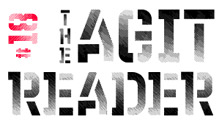
4
Kemado
Gustav Ejstes has, from the beginning, been strident in his search for nostalgia, always looking to perfect the psychedelic ‘60s, though fully aware they’ve already been perfected. Dungen’s 4 may not have the blast-through immediacy of Tio Bitar, but Ejstes’ scope has decidedly matured past the acid-fried to include orchestral swells and improvised inflections, perfect but forgotten corners of lysergic wonderlands that lend a density to his compositions that transcend imitation. 4 could be Swedish alchemists (circa 1969) hoping to fuse the Canterbury sound, elegiac soft-pop, and San Francisco sunshine; in Dungen’s hypothetical they achieve this with timeless effect.
Ejstes devotes mile-wide swaths of 4 to his current instrument of obsession, the piano, evoking the prog-jazz cool of Soft Machine’s Volume Two on the album’s lead “Satt Att Se,” the velvet chamber-psych of the Left Banke on “Ingenting Ar Sig Likt,” and the whimsical forest-frolic of Caravan on “Bandhagen,” in his melodious, yet somber playing. Still with guitarist Reine Fiske at his hip and his first full-band wrapping the songs in dusty gauze, Ejstes can mine the vaults of countrymen Pugh Rogefeldt and Trad Gras och Stenar to conjure Scandinavian exotica that goes beyond his Swedish tongue. How Dungen weave in all the sinister weeping strings and frivolous flute solos without regurgitated novelty is their trademark.
“Samtidgt 1” and “Samtidgt 2,” though instrumentals that seem to flow in and out of a greater plan, are the glue that keeps 4 a treasure. The former scatters like a Hendrix mescal trip, while the latter skips along like Garcia on hot coals, the best of Dick’s Picks magnified into two live excursions from the unknown. That shouldn’t deter from 4’s real mission, a low-keyed mellow-drama, Estjes suckling from fever dreams of earthly delights and organics that lend to his mystique. He possess a key to the secrets of psychedelia too many of his peers have never found.
Kevin J. Elliott
MP3: “Sätt At Se”

Un Dia
Domino
After several albums, 2004’s Tres Cosas in particular, of electronic ingenuity enriched by folk influences from her Argentinean heritage, Juana Molina returns with an album sparked with the same singular creativity but that escapes redundancy. Tres Cosas and, to a lesser extent, Son operated in an idiosyncratic vacuum of dramatic differences in volume and texture, with Molina creating rhythms out of the smallest of gestures while at the same time building intricate layers of loops. Un Dia is constructed from more concrete building blocks, but is no less obtuse. The only difference is Molina’s focus has shifted. The opening title track finds her letting out a call to take up the record’s cause, which seems to be rhythm. While she begins to loop her own voice and sundry embellishments, it’s the cut’s primal throb that takes centerstage, a repetitive pulsation that’s not quite a beat but the song’s rhythmic base nonetheless. On “Vive Solo” that pulse is less obfuscated. Big bass thuds once again lend a primitive feel, but as Molina loops her Portuguese scat, the song becomes as future-tensed as any. Closer “Dar (Que Dificil)” is just as stellar, this time an acoustic bass pluck so low it’s almost subliminal provides the backbone. Over top Molina runs nylon-stringed guitar scratches and a mix of electro tones and finger piano clinks. Un Dia may be Molina’s best record yet—for all the reasons it’s like her others and for all the reasons it ain’t.
Stephen Slaybaugh

Crystal Antlers ep
Touch and Go
This year has been good to Crystal Antlers. Chatter surrounding the Long Beach, California band has steadily gotten louder over the course of 2008. This summer, the Antlers put their time on the F-Yeah Tour to good use, proving themselves as one of the vegetable oil–powered caravan’s true standout acts. And now, with a full-length LP in the works, Touch and Go Records has recently reissued the band’s self-titled (and formerly self-released) EP.
On first listen, it could be said that the six-song record finds the band moving in a number of different directions. But while the five-piece draws water from a number of stylistic wells, the EP most consistently features what might be described as a noise-psychedelic sound, and ultimately, the band is at its best when showcasing a refined ability to work its vast dynamic range. “Until the Sun Dies (Part 2)” alternates between a tense, driving riff underlying vocalist Jonny Bell’s screams and a more relaxed, cascading groove. “A Thousand Eyes” takes it a step further, throwing in a memorably melodic chorus to the mix. The band also has the ability to focus when it needs to, though; “Vexation” sounds like a more humanoid version of Braniac (also once of Touch and Go), while “Owl” presents a deeper trek into the Antlers’ take on psychedelia. Mark Crystal Antlers down as a solid debut—strong enough that you might want to keep an eye on where these guys might go in the coming year.
Ron Wadlinger

The Chemistry of Common Life
Matador
The members of Fucked Up have built their band around the quality of elusiveness, shunning MySpace in favor of Wikipedia and their real names for madcap aliases. It seems fitting, then, for them to release a sophomore record just as schizophrenic as their persona. Fucked Up, comprised of 10,000 Marbles, Pink Eyes, Mustard Gas, Gulag, Young Governor and Mr. Jo, is known for their raucous, “we don’t give a fuck” fusion of hardcore and punk. (Hence, the clever choice of band name, which cannot be read aloud in American media.) However hardcore Fucked Up would like to appear, their music on The Chemistry of Common Life speaks otherwise. The only thing “hardcore” about this record is the vocals, which are, unfortunately, quite abrasive.
It is rare to hear a punk band use more than three chords, but the utilization of 18 guitars in one song (“No Epiphany”), organs and wind instruments is almost unheard of. This is how Fucked Up defies the standards and weaves through genres. Almost every song on Chemistry begins with a long, swelling introduction that sets the stage for a fantastic magnum opus that never quite comes to fruition—or rather, these haunting and catchy instrumental melodies are inevitably drowned out by Pink Eye’s gut-wrenchingly raspy voice. His range is ear-achingly close to Erick “Buddah” Medina’s (of Blood for Blood) gravel-pit yowling. While Eye’s spew is certainly distinctive, it makes for indistinguishable lyrics and flat songs, with no discernible hooks or choruses. Those thoughtful intros are wasted on songs that begin to sound monotonous after the harsh droning vocals kick in.
Thankfully, Fucked Up had the sense to bring female voices into the album, with the help of the Vivian Girls and Katie Stelmanis. Their presence adds much needed depth to Pink Eye’s grate. This is most evident in “Royal Swan,” where oddly enough, the contrast between harsh voice and the high-pitched female crooning is surprisingly satisfying. While overlooking the raspy growl is quite a challenge, the musicianship on this album is superb for its genre. The members of Fucked Up use their second full-length album to challenge the conventions of punk and hardcore—as well as vocal chords. In the end, however, this style of yelling/singing is best left for bands with no real musical talent behind them.
Jennifer Farmer
MP3: “No Epiphany”

Devastator
Secretly Canadian
Guitarist and crooner George Hunter has it bad. Catfish Haven, his trio, is the essence of classic rock, and as a relatively young band they have to fight like sharks in a pool full of classic rock revivalists to vie for the chum of authenticity. In an age when bands like the Black Keys hire Dangermouse for a bail-out and Kings of Leon have handlers that allow them to slowly rot into a second-rate U2 (with a twang), Catfish Haven channel farther back than Asbury Park, even when they seem born to run. As residents of Chicago, Hunter and his crew are still suspect to have trespassed on the Crossroads and Motown (or for that matter some quintessential Prince cuts) to assemble the gospel of “Set in Stone” or the call and response energy of “Are You Ready.”
Devastator is a turning point. The hustle of the metropolis is still heard in the quick rattling chords that compose their acoustic-minded roots-rock. They’ve been footloose from the beginning, but here the roughhewn is eschewed for a grand vision. On those aforementioned songs the band has employed true juke joint/blues brothers’ horns, background singers and big hall piano pounds. Devastator has the spirit of the all-star soul revue performed in grainy black and white as well as the stench of nitty-gritty dirt-road canteens where the stages come wrapped in chicken wire.
Hunter’s voice, a cross of Bob Segar and Joe Cocker, may take some getting used to, and leading such hokey harmonica send-ups as “Buying My Time” and the twinkling prom-themed “Valerie” are almost laughable on first listen. Realizing the passion and conviction of what they do here finally comes with the Santo and Johnny balladry of “Every Day,” there’s a real soul deep in their bones, real sweat on the brow. Flip Devastator over a second time and put down your guard. This go-round Catfish Haven become perhaps the most authentic of these hick types you’ve heard in years.
Kevin J. Elliott
MP3: “Set in Stone”
ALBUM REVIEWS
Mogwai, The Hawk Is Howling
Tom Morello, The Fabled City
Portugal. The Man, Censored Colors
Brightblack Morning Light, Motion to Rejoin
Tindersticks, Hungry Saw
The Standard, Swimmer
War Tapes, War Tapes EP
Calexico, Carried to Dust
The Donkeys, Living on the Other Side
Michael Franti & Spearhead, All Rebel Rockers
Master Slash Slave, Scandal
Ten Kens, Ten Kens
Damien Jurado, Caught in the Trees
Chad VanGaalen, Soft Airplane
